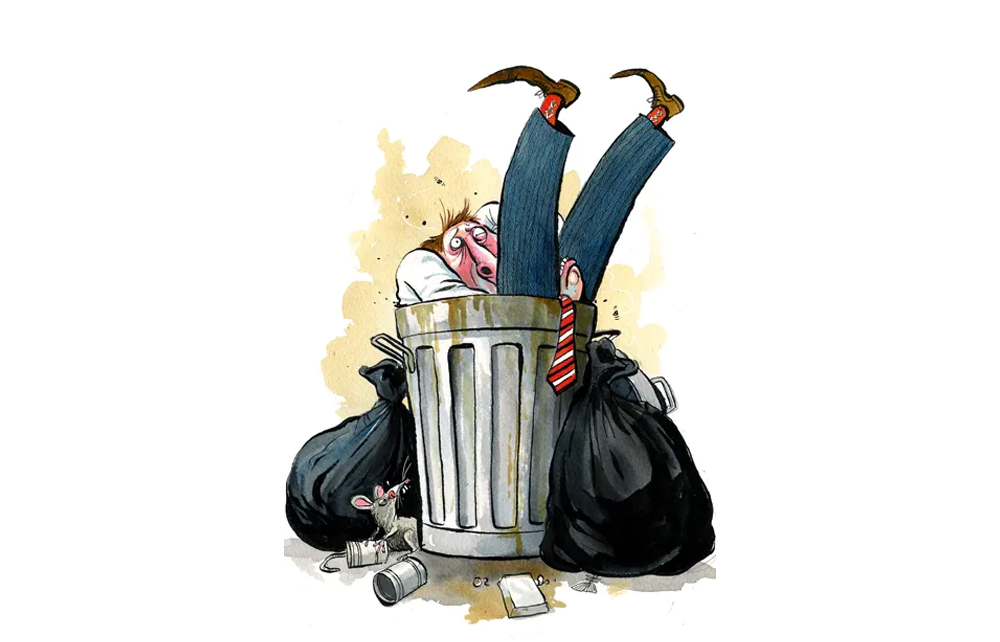Crisis of the American man
“Important” is an overused word in the book trade; there are no prizes for modest understatement on dust jackets and in publishers’ press releases. But I wouldn’t be surprised if, in a few years’ time, we look back on the publication of Of Boys and Men, a new book by the Brookings Institution fellow Richard V. Reeves, as an important moment in overlapping debates over masculinity, feminism and gender.
Reeves, a center-left moderate working at a bastion of establishment liberalism, has written a short, carefully argued book that rings the alarm on the crisis facing boys and men in America, and in the West more generally. From the education system and the workforce to family life, measuring graduation rates, worklessness, suicide rates and overdose deaths, the evidence of the challenges facing American men is overwhelming.
A few of the grim numbers in Reeves’s book: one in three American men with only a high school diploma is out of the American workforce, with the biggest fall in employment among young men. American men as a whole are earning less, in real terms, than they were in 1979. Men are getting lonelier too. In 1990, just 3 percent of men said they had no close friends. Today the figure is 15 percent.
Reeves quotes Simone de Beauvoir, the feminist author who said “a man would never get the notion of writing a book on the peculiar situation of the human male.”
“That was 1949,” writes Reeves, “Now the peculiar situation of the human male requires urgent attention.”
To raise concern about these problems is to challenge a number of progressive shibboleths. First, Reeves explicit about not just the existence of, but also the importance of, the biological differences between the sexes. At a time when even acknowledging biological differences between men and women is getting harder in many liberal circles, Reeves dares to think that they might actually matter.
Second, the premise of Of Boys and Men contradicts the idea of an enduring patriarchy and undercuts the argument that, when it comes to gender politics, the overwhelming priority should be further female advancement. Reeves was relaxed about the potential blowback when I spoke to him earlier this week. He’s written a good-faith study of an important problem and seems sanguine about what objections that might prompt.
“I’m trying to create space,” Reeves tells me in an interview this week. “It’s about saying, ‘We’re OK. It’s safe. You have permission.’ The fact that we’re having this conversation does not mean we’re about to join the men’s rights movement.” Here are some highlights from that conversation.
On whether the causes of mens’ problems are cultural or economic
“Big economic changes have cultural consequences. In this case, we’ve seen external factors like the impact of trade and globalization which have disproportionately hit men’s jobs. That’s just a fact. No one denies it. But there’s something more than that, which is the economic relationship between men and women, and the breaking of the chains of dependency between men and women. So the economic rise of women, that’s the rise of women economically relative to men, and therefore the relative decline of men… the change in the economic balance of power between men and women is not just and economic fact, it’s an incredibly important cultural fact. In fact it is a transformational cultural fact, given the history of family life, and given how the chains of dependency between men, women and children have been the central glue for the social institution of the family for a very, very long time… And those chains of dependency have been very significantly broken, close to entirely broken, in the blink of an eye… Understanding economic trends is vital to understanding the cultural changes that result from that.”
On why the Biden administration isn’t more interested in this problem
“They have a political calculation, which I understand but I think is wrong. A live example is the infrastructure act. The legislations has been criticized by some women’s think tank groups because 70 percent of the jobs will go to men. Working-class men, and disproportionately men of color. So here’s a bill that will create jobs for working-class men, especially black and Hispanic men. And the only attention that has got has been for Biden to be attacked for that.
“I can imagine a world where Biden would come out and says ‘I’m really worried about working class men, and guess what? The infrastructure bill helps working-class men, especially Hispanic and black working-class men.’ But the calculation is that that will piss off white suburban liberal women. That’s the calculation. They think that if they do anything on the issue, it will distract from the main message which is that Republicans hate women, we’re going to support women, vote for us. I think that’s a miscalculation. Done well, and done thoughtfully, there are plenty of women out there, as well as men, who would actually be quite receptive to that message. By the way, it would also blunt the attack from the right.”
On the success of feminism
“There are legitimate concerns that remain, particularly at the apex of society. We still haven’t had a female president, still only 25 percent of our members of Congress are women. But I think there’s been a failure to update our priors about some of these problems to meet with modern reality… The gender pay gap is much smaller than it was, it’s much more about childrearing, it’s a much, much more complex story and it’s not the result of employee discrimination anymore. And so to the extent that we’re in a ‘patriarchy,.’ well, you’ve got to really define your terms at that point and you’ve got to wonder: how would we know when we weren’t.
“One of the key points is that most of the trend lines that we care about for girls and women are going the right way. Maybe too slowly. But they are going the right way. Whereas a lot of the trend lines we worry about for men: health, employment, family structure, fathering. They’re going the wrong way.
“Is there still work to do? Sure, but now if you look at the challenges for men, especially working class men, it’s irresponsible to look away.”
*** Sign up to receive the DC Diary in your inbox here ***
Biden and DeSantis on their best behavior
Biden will survey damage from Hurricane Ian in Florida today. Accompanying him during the visit will be one of his biggest political rivals, Ron DeSantis. The media desperation to turn the response to Hurricane Ian into a Biden-DeSantis psychodrama is palpable, but so far, the politicians have behaved better than the press would like. And, in the aftermath of the disaster, neither has much incentive to do anything other than play the mature, bipartisan statesman.
Lift-off for Elon
Is Elon Musk going to buy Twitter after all? It’s been six months since he first made a bid for the company and, after withdrawing that bid, plenty of legal wrangling and finger-pointing, the sale is back on. As Bloomberg reported yesterday, Musk made an offer for Twitter at the originally agreed price on Monday, and the social media company says it plans to close the deal.
I confess to not keeping up with every twist and turn of the Musk-Twitter acquisition feud. But the upshot of it all is that, if the transaction goes through, perhaps the most important platform for political debate will have an avowedly pro-free speech, anti-censorship owner. Amid the messiness of the acquisition, that is a change for the better.
What you should be reading today
Francis Pike: America’s chip war with China
Ben Domenech: Degenerate sports gambling is good for the soul
Harry J. Kazianis: Why Russia could use nukes in Ukraine
Hayley Bird Wilt, the Dispatch: Plan to grant more green cards to STEM graduates resurfaces
Leonid Bershidsky, Bloomberg Opinion: Putin’s hawks are no longer in step
Henry Olsen, Washington Post: Why Walker’s abortion hypocrisy won’t matter
Poll watch
President Biden job approval
Approve: 42.7 percent
Disapprove: 53.3 percent
Net approval: -10.4 (RCP average)
New Hampshire Senate race
Maggie Hassan (D): 49 percent
Don Bolduc (R): 43 percent (St. Anselm)


















